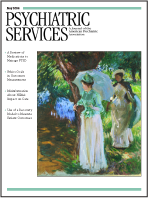Integrated Treatment for Mood and Substance Use Disorders
Over the past few years, more than a dozen books about clinical approaches to patients with co-occurring mental illnesses and substance use disorders have appeared. Each has its niche. In this short edited volume, three outstanding addiction psychiatrists provide practical information for frontline clinicians—medical and nonmedical—who treat patients who have co-occurring mood and substance use disorders.
Several features of Integrated Treatment for Mood and Substance Use Disorders are excellent. Most of the chapters offer a practical, useful perspective, and several add clarity to relatively neglected but common clinical situations. The focus on interactions between mood disorders and substance use disorders is needed, not only because these interactions are so common but also because several recent books either are generic—that is, they address all disorders—or are specific to patients who have severe mental illness and a substance use disorder. Individual chapters in this book address the problem of nicotine addiction, which is often ignored in dual diagnosis programs, and the dilemma of evaluating and managing patients who are not responding to their current treatment regimens. Both nicotine addiction and treatment nonresponse are everyday clinical issues with which clinicians need practical assistance.
As with nearly all edited books, the chapters of this book are uneven. Some are heavy on research and some on personal experience. The most satisfactory chapters, such as the outstanding one on psychopharmacology by Weiss, incorporate in their structure the hierarchy of evidence-based medicine. That is, they present an empirically based overview of the field; they clearly differentiate between evidence from controlled clinical trials, uncontrolled or correlational research, and clinical experience; and they formulate practical algorithms with appropriate levels of confidence. This type of synthesis requires the depth of experience and wisdom that one hopes to find among teachers and clinical researchers.
Several relevant trends in behavioral health care are clear. The field is slowly acknowledging that patients with dual diagnoses are modal patients and that all clinicians and programs need competence related to integrated treatment for co-occurring disorders. Many clinical research groups in the United States and elsewhere are combining mental health and substance abuse interventions with self-help approaches and recovery concepts, as described in this book, and empirical validation of these approaches is proceeding. An evolving body of clinical research as well as a commitment to evidence-based medicine is emerging. One hopes that the editors of this volume will continue to review and synthesize efforts in the area of co-occurring mood and substance use disorders.
Dr. Drake is affiliated with the department of psychiatry of Dartmouth Medical School in Lebanon, New Hampshire.



